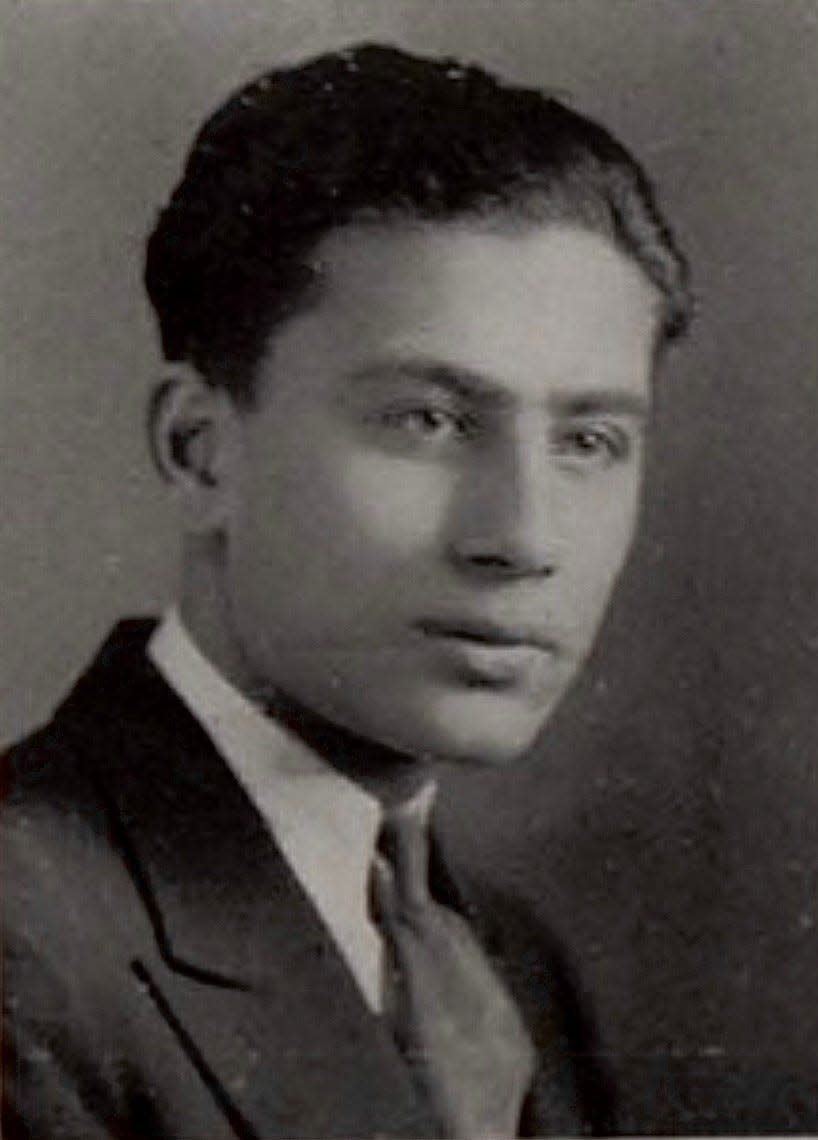WWII soldier whose remains went unidentified for decades will return to RI for burial

- Oops!Something went wrong.Please try again later.
A son of East Providence who died fighting in Germany during one of the bloodiest battles of World War II is being brought home to Rhode Island after his body went unidentified for decades.
The remains of Army Pfc. George B. Thomas will be buried with military honors at 1 p.m. July 10 at Rhode Island Veterans Memorial Cemetery in Exeter, according to the Department of Defense and Rebello Funeral Home and Crematory in East Providence.
Known to many as "Bud," Thomas "was a selfless and courageous individual who dedicated his life to serving his country," his obituary says.
Thomas had lived in East Providence all of his life before joining the Army. He was reported missing in action on Nov. 24, 1944, while his unit was fighting German forces in the Huertgen Forest. He was 31 years old.
More: RI soldier identified more than 70 years after he died in a North Korean POW camp
Thomas's body was not recovered during the battle, and the Germans never reported him a prisoner of war. His remains, recovered in 1948 from a field south of Huertgen, were finally identified in March of this year by circumstantial evidence as well as anthropological and mitochondrial DNA analysis, the DOD's Defense POW/MIA Accounting Agency said.
It's the second time in recent months that the DPAA announced identifying the remains of a Rhode Island soldier. In March, the agency announced it had identified the remains of Army Sgt. Lawrence Robidoux, a 22-year-old soldier from Cumberland who died of starvation in a prisoner of war camp during the Korean War.
Thomas's nephew Richard Thomas of Riverside provided a DNA sample to help identify his uncle. Now in his 80s, Richard Thomas plans to attend his uncle's burial next Monday.
"We're going to bring him back home," Richard Thomas said.
George Thomas grew up on Taunton Avenue in a large family with four sisters and three brothers. Three of the Thomas brothers fought in World War II but only two returned, Richard Thomas said.
All of the siblings are deceased now, including Richard Thomas's father, Michael, a former Journal sportswriter. Richard Thomas was 4 when his uncle died, and he doesn't have much memory of him. He recalls an aunt showing him his uncle's Purple Heart medal.
The family didn't talk much about George Thomas's death. "I guess it was too tough for them," Richard Thomas said.
A high school yearbook described Thomas as an accomplished golfer. "Bud has always possessed a deep voice and an aptitude for oratory during his stay here," the yearbook said. "His voice is better suited for oratory, however than for conversation in class, as his lowest whisper is easily heard all over the room."
Thomas's obituary says, "Bud's selfless and courageous nature was evident not only during his military service but also in his personal life. He was a devoted son, brother and uncle who prioritized the well-being of his family above all else. His kindness and generosity extended to his friends and community, who will always remember him as a pillar of strength and support."
On Nov. 23, 1944, Thomas was serving with a regiment ordered to clear out of a pocket of German troops between the municipalities of Vossenack and Huertgen, according to the DPAA.
"At the time, the Battle of the Huertgen Forest, one of the bloodiest conflicts of World War II, was being fought between Allied and German forces," the DPAA said. "As U.S. forces had advanced eastward into Germany in September 1944, the defending Germans manned 'Siegfried Line' positions opposite the Belgian border, halting the Allied advance and leading to protracted fighting through the winter."
As Thomas's battalion moved in, they came under intense artillery fire, killing 140 men, including Thomas, the DPAA said.
After the war, the American Graves Registration Command made several investigations in the Huertgen area in an effort to recover the remains of missing American soldiers, but the investigators couldn't identify Thomas's remains, according to the DPAA. He was declared nonrecoverable in February 1951.
Years later, a historian with the DPAA determined that one of two sets of unidentified comingled remains could be associated with Thomas. After their recovery in Germany, Thomas's remains were buried in the Ardennes American Cemetery in Belgium. The remains were disinterred in July 2021 and sent to the DPAA laboratory at Offutt Air Force Base, Nebraska, for analysis and identification.
Thomas was the son of the late George and Annie Thomas, according to his obituary. He was the brother of the late Michael Thomas, Paul Thomas, John Thomas, Helen Saad, Victoria Thomas, Adele George and Hannah Thomas. He is survived by several nieces and nephews and great-nieces and great-nephews.
"Private First Class George B. Thomas was a true American hero," his obituary says, "and his legacy will continue to inspire future generations."
This article originally appeared on The Providence Journal: Remains of WWII soldier from RI ID'd decades after death in Germany

